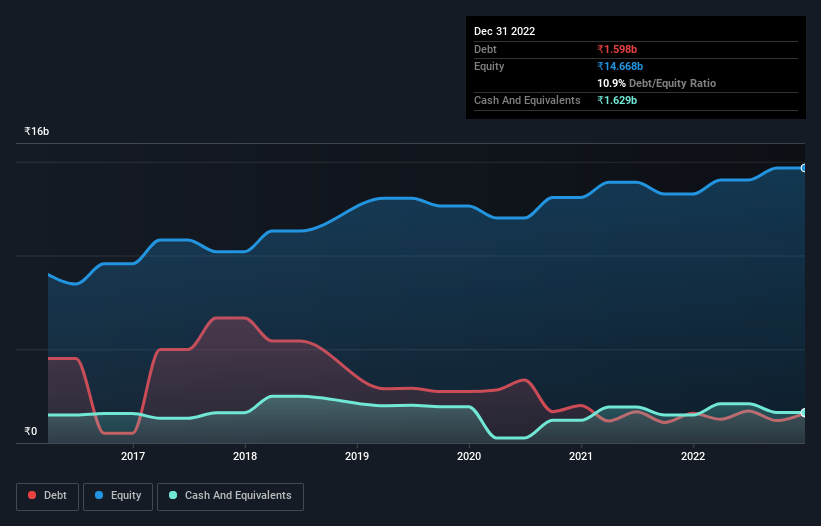
Legendary fund manager Li Lu (who Charlie Munger backed) once said, 'The biggest investment risk is not the volatility of prices, but whether you will suffer a permanent loss of capital.' So it might be obvious that you need to consider debt, when you think about how risky any given stock is, because too much debt can sink a company. We can see that Jyothy Labs Limited (NSE:JYOTHYLAB) does use debt in its business. But is this debt a concern to shareholders?
Why Does Debt Bring Risk?
Debt is a tool to help businesses grow, but if a business is incapable of paying off its lenders, then it exists at their mercy. In the worst case scenario, a company can go bankrupt if it cannot pay its creditors. While that is not too common, we often do see indebted companies permanently diluting shareholders because lenders force them to raise capital at a distressed price. Of course, debt can be an important tool in businesses, particularly capital heavy businesses. When we examine debt levels, we first consider both cash and debt levels, together.
Check out our latest analysis for Jyothy Labs
How Much Debt Does Jyothy Labs Carry?
As you can see below, Jyothy Labs had ₹1.60b of debt, at September 2022, which is about the same as the year before. You can click the chart for greater detail. However, it does have ₹1.63b in cash offsetting this, leading to net cash of ₹31.1m.

How Strong Is Jyothy Labs' Balance Sheet?
Zooming in on the latest balance sheet data, we can see that Jyothy Labs had liabilities of ₹5.39b due within 12 months and liabilities of ₹971.5m due beyond that. On the other hand, it had cash of ₹1.63b and ₹1.84b worth of receivables due within a year. So its liabilities total ₹2.89b more than the combination of its cash and short-term receivables.
Of course, Jyothy Labs has a market capitalization of ₹66.8b, so these liabilities are probably manageable. However, we do think it is worth keeping an eye on its balance sheet strength, as it may change over time. Despite its noteworthy liabilities, Jyothy Labs boasts net cash, so it's fair to say it does not have a heavy debt load!
And we also note warmly that Jyothy Labs grew its EBIT by 20% last year, making its debt load easier to handle. When analysing debt levels, the balance sheet is the obvious place to start. But it is future earnings, more than anything, that will determine Jyothy Labs's ability to maintain a healthy balance sheet going forward. So if you want to see what the professionals think, you might find this free report on analyst profit forecasts to be interesting.
Finally, while the tax-man may adore accounting profits, lenders only accept cold hard cash. While Jyothy Labs has net cash on its balance sheet, it's still worth taking a look at its ability to convert earnings before interest and tax (EBIT) to free cash flow, to help us understand how quickly it is building (or eroding) that cash balance. During the last three years, Jyothy Labs generated free cash flow amounting to a very robust 91% of its EBIT, more than we'd expect. That puts it in a very strong position to pay down debt.
Summing Up
While it is always sensible to look at a company's total liabilities, it is very reassuring that Jyothy Labs has ₹31.1m in net cash. The cherry on top was that in converted 91% of that EBIT to free cash flow, bringing in ₹1.1b. So is Jyothy Labs's debt a risk? It doesn't seem so to us. When analysing debt levels, the balance sheet is the obvious place to start. However, not all investment risk resides within the balance sheet - far from it. Case in point: We've spotted 1 warning sign for Jyothy Labs you should be aware of.
If, after all that, you're more interested in a fast growing company with a rock-solid balance sheet, then check out our list of net cash growth stocks without delay.
New: Manage All Your Stock Portfolios in One Place
We've created the ultimate portfolio companion for stock investors, and it's free.
• Connect an unlimited number of Portfolios and see your total in one currency
• Be alerted to new Warning Signs or Risks via email or mobile
• Track the Fair Value of your stocks
Have feedback on this article? Concerned about the content? Get in touch with us directly. Alternatively, email editorial-team (at) simplywallst.com.
This article by Simply Wall St is general in nature. We provide commentary based on historical data and analyst forecasts only using an unbiased methodology and our articles are not intended to be financial advice. It does not constitute a recommendation to buy or sell any stock, and does not take account of your objectives, or your financial situation. We aim to bring you long-term focused analysis driven by fundamental data. Note that our analysis may not factor in the latest price-sensitive company announcements or qualitative material. Simply Wall St has no position in any stocks mentioned.
About NSEI:JYOTHYLAB
Jyothy Labs
Engages in the manufacture and marketing of fabric care, dishwashing, personal care, and household insecticides products in India and internationally.
Flawless balance sheet average dividend payer.
Market Insights
Community Narratives



